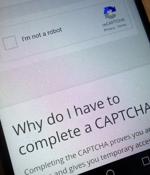Security News

DataDome - a seven-year-old company whose job it is to protect websites, mobile apps and APIs from online fraud and automated threats - doesn't believe the end of CAPTCHA is nigh. If anomalies indicate a bot is trying to access the site, DataDome's technology may move the session to a CAPTCHA. Even then, the signals will indicate whether it's the legitimate user or something else using DataDome CAPTCHA. "It's not only about if the CAPTCHA is solved," Fabre said.

Apple has introduced a game-changer into its upcoming iOS 16 for those who hate CAPTCHAs, in the form of a feature called Automatic Verification. The feature does exactly what its name alludes to: automatically verifies devices and Apple ID accounts without any action from the user.

Security firm Avanan on Thursday published its latest analysis of a phishing technique that builds on the internet community's familiarity with CAPTCHA challenges to amplify the effectiveness of deceptions designed to capture sensitive data. CAPTCHA puzzles, such as Google's reCAPTCHA, can act as a roadblock for these scanners because the filters can't solve the puzzles.

If it doesn't offer the protection it once did, and its major accomplishment for the past 12 years is that it slows down the customer purchase process, we have to ask ourselves: Why are CAPTCHAs still a thing? While attack technology has evolved, CAPTCHAs have not kept up with the times.

A team of researchers at the Universities of Arizona, Georgia, and South Florida, have developed a machine-learning-based CAPTCHA solver that they claim can overcome 94.4% of real challenges on dark websites. The collection of cyber-threat intelligence from illicit dark web markets and forums becomes challenging and expensive, as employees have to be involved in the CAPTCHA solving step.

New Skype users report frustration after being presented with a captcha that requires them to solve a complex puzzle ten times before signing up for the service. Tests by BleepingComputer confirmed the problematic captcha required when signing up for a Microsoft account via Skype-even after verifying your email address.

A malware campaign uses a clever captcha prompt to trick users into bypassing browsers warnings to download the Ursnif banking trojan.Yesterday, security researcher MalwareHunterTeam shared a suspicious URL with BleepingComputer that downloads a file when attempting to watch an embedded YouTube video about a New Jersey women's prison.

Cyberattackers are using Google's reCAPTCHA and fake CAPTCHA-like services to obscure various phishing and other campaigns, according to researchers. CAPTCHAs are familiar to most internet users as the challenges that are used to confirm that they're human.

Analyst firm Gartner has advised in favour of the use of CAPTCHAs - but recommends using the least-annoying CAPTCHAs you can find. The firm's opinion is contained in a post by senior director analyst Akif Khan, who noted that CAPTCHAs create friction for humans but remain an imperfect defence against bots.

Cloudflare research engineer Thibault Meunier assumed that the average internet user sees a CAPTCHA once ever ten days and multiplied that by world's 4.6 billion internet users and Cloudflare's 32-second CAPTCHA-completion estimate to assert that humanity collectively spends 500 years every day completing CAPTCHAs. Cloudflare will initially support three - YubiKeys, HyperFIDO keys; and Thetis FIDO U2F. "Completing this flow takes five seconds," Meunier asserts in a post on Cloudflare's blog.